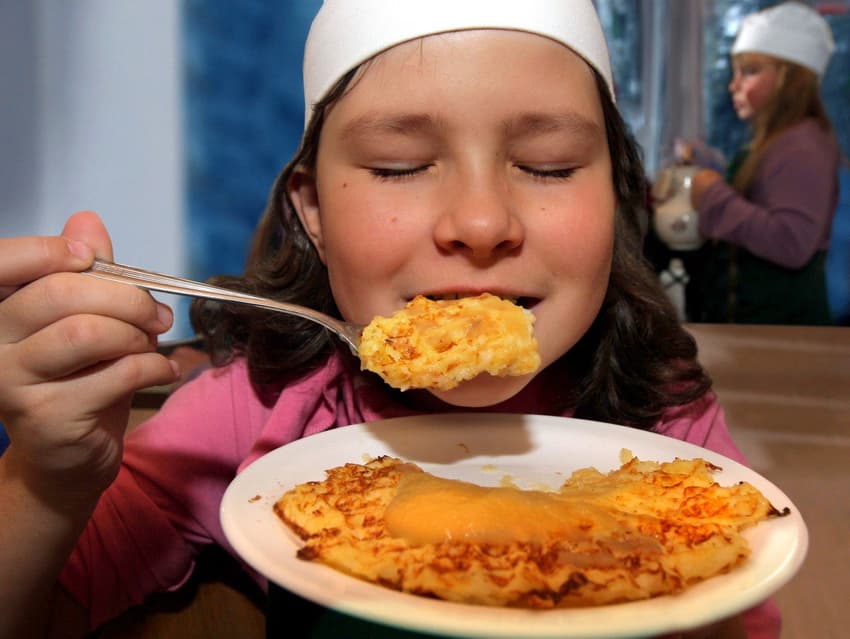Living in Germany: Housing market winners and losers, Fichtelberg and Kartoffelpuffer

In our weekly roundup, we look at who's doing well in the German housing market, taking quiet hours to the next level and Germany's love of potatoes.
Germany’s housing market has winners and losers
Anyone who’s tried to find a new home to rent in the country’s crowded housing market - especially the larger cities like Berlin, Munich and Hamburg - knows how soul-destroying the process is. And this week the German government admitted that it would miss its target of building 400,000 new homes annually - by a large margin. Building more homes - with a focus on affordable housing - was a key pledge by the coalition of Social Democrats (SPD), Greens and Free Democrats (FDP) when they took office.
This, they said, would address the housing shortages people are having to contend with. These problems often affect foreigners coming to live in Germany because they are new tenants to the market and unable to get their hands on much lower-cost older contracts (unless they are lucky).
But as The Local’s columnist Brian Melican pointed out, there are some groups who are not having a tough time right now, especially compared to other European housing markets. “The most fortunate group are existing owner-occupiers,” Melican says.
“Although property prices had become over-inflated of late and are now falling, this will not lead to a collapse in the housing market and homes being repossessed.” Buy-to-let landlords are also doing well, while the outlook isn’t bad for existing tenants either, Brian argues. The question is: when will the German government and states come up with any practical solutions to improve people’s chances of finding a reasonably priced flat?
Tweet of the week
Germans are known for being fairly strict when it comes to obeying Ruhezeit (the commonly agreed upon quiet hours in apartment buildings). But asking every floor in a Berlin highrise to be quiet for an afternoon video call is taking things to a new level. We only have respect!
Someone posted a note (in EN & DE) on *every single floor* in our 18-story building asking us to be quiet from 4:30 - 6:30 pm because they have a video call. pic.twitter.com/ZSy0bJOFmQ
— cherrysberries (@cherrysberries) January 26, 2023
Where is this?

Photo: picture alliance/dpa | Hendrik Schmidt
Visitors to the Fichtelberg in Oberwiesenthal, Saxony, were treated to blue skies and sunshine on Thursday due to a weather inversion. Here, guests on the 1215-metre high Fichtelberg look over the clouds in the valley to the Keilberg on the Czech side. Since Wednesday the lifts in Saxony's largest alpine skiing area have been in operation again and are keeping the slopes busy.
Did you know?
Germany’s love affair with potatoes is well documented. Potatoes are said to have first arrived in Germany in 1630 from Peru, but it was not until Friedrich the Great's (King of Prussia 1740-1742) reign that they became popular. Friedrich the Great believed so deeply in both the economic and nutritious value of potatoes that he even passed the so-called Kartoffelbefehl (potato decree) in 1756 to attempt to educate the rural population as to the benefits of the potato.
Of course, there’s the classic German favourite Kartoffelsalat, but let’s today focus on another dish with the humble potato - Reibekuchen, also sometimes known as Reibeplätzchen, Kartoffelpuffer or Kartoffelpfannkuchen. These are delicious fried potato pancakes made from grated potato, onion, eggs and flour. They are particularly popular in the winter time (especially at Christmas markets) and can be served either sweet or savoury. So you can eat them with apple sauce, quark or another dip of your choice. Mahlzeit!
Comments
See Also
Germany’s housing market has winners and losers
Anyone who’s tried to find a new home to rent in the country’s crowded housing market - especially the larger cities like Berlin, Munich and Hamburg - knows how soul-destroying the process is. And this week the German government admitted that it would miss its target of building 400,000 new homes annually - by a large margin. Building more homes - with a focus on affordable housing - was a key pledge by the coalition of Social Democrats (SPD), Greens and Free Democrats (FDP) when they took office.
This, they said, would address the housing shortages people are having to contend with. These problems often affect foreigners coming to live in Germany because they are new tenants to the market and unable to get their hands on much lower-cost older contracts (unless they are lucky).
But as The Local’s columnist Brian Melican pointed out, there are some groups who are not having a tough time right now, especially compared to other European housing markets. “The most fortunate group are existing owner-occupiers,” Melican says.
“Although property prices had become over-inflated of late and are now falling, this will not lead to a collapse in the housing market and homes being repossessed.” Buy-to-let landlords are also doing well, while the outlook isn’t bad for existing tenants either, Brian argues. The question is: when will the German government and states come up with any practical solutions to improve people’s chances of finding a reasonably priced flat?
Tweet of the week
Germans are known for being fairly strict when it comes to obeying Ruhezeit (the commonly agreed upon quiet hours in apartment buildings). But asking every floor in a Berlin highrise to be quiet for an afternoon video call is taking things to a new level. We only have respect!
Someone posted a note (in EN & DE) on *every single floor* in our 18-story building asking us to be quiet from 4:30 - 6:30 pm because they have a video call. pic.twitter.com/ZSy0bJOFmQ
— cherrysberries (@cherrysberries) January 26, 2023
Where is this?

Visitors to the Fichtelberg in Oberwiesenthal, Saxony, were treated to blue skies and sunshine on Thursday due to a weather inversion. Here, guests on the 1215-metre high Fichtelberg look over the clouds in the valley to the Keilberg on the Czech side. Since Wednesday the lifts in Saxony's largest alpine skiing area have been in operation again and are keeping the slopes busy.
Did you know?
Germany’s love affair with potatoes is well documented. Potatoes are said to have first arrived in Germany in 1630 from Peru, but it was not until Friedrich the Great's (King of Prussia 1740-1742) reign that they became popular. Friedrich the Great believed so deeply in both the economic and nutritious value of potatoes that he even passed the so-called Kartoffelbefehl (potato decree) in 1756 to attempt to educate the rural population as to the benefits of the potato.
Of course, there’s the classic German favourite Kartoffelsalat, but let’s today focus on another dish with the humble potato - Reibekuchen, also sometimes known as Reibeplätzchen, Kartoffelpuffer or Kartoffelpfannkuchen. These are delicious fried potato pancakes made from grated potato, onion, eggs and flour. They are particularly popular in the winter time (especially at Christmas markets) and can be served either sweet or savoury. So you can eat them with apple sauce, quark or another dip of your choice. Mahlzeit!
Join the conversation in our comments section below. Share your own views and experience and if you have a question or suggestion for our journalists then email us at [email protected].
Please keep comments civil, constructive and on topic – and make sure to read our terms of use before getting involved.
Please log in here to leave a comment.